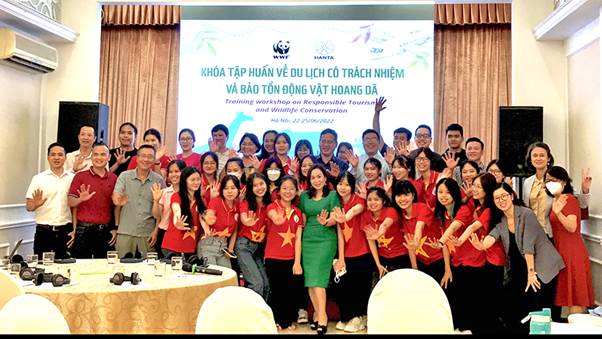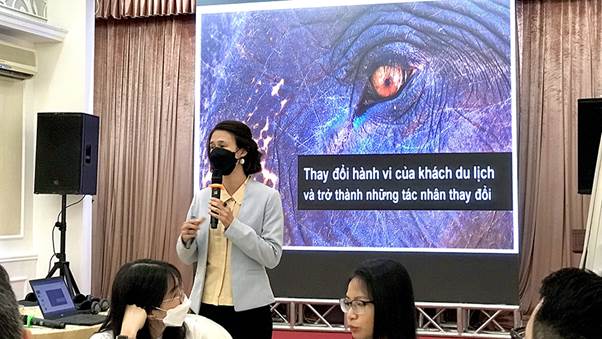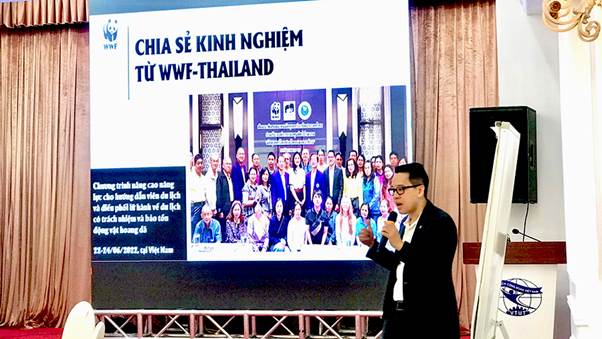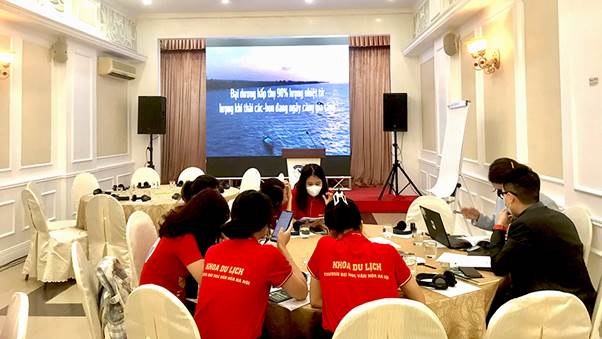(TITC) - On 22nd June 2022, in Ha Noi, World Wildlife Fund Vietnam (WWF-Vietnam) coordinated with Ha Noi City Department of Tourism, Ha Noi Tourism Association to organise training workshop on Responsible Tourism and Wildlife Conservation for 150 tour guides and travel managers in the capital.

Training workshop on Responsible Tourism and Wildlife Conservation. Photo: WWF-Vietnam
Participating in the training workshop, trainees are equipped with knowledge about responsible tourism and wildlife conservation; status of illegal wildlife trade and evidence of illegal wildlife trade through tourism channels. Warning of risks related to the act of introducing, brokering and buying and selling wildlife products. The training workshop shared a number of good and particular models and lessons about responsible tourism associated with nature and wildlife conservation in the world and in Vietnam.
The training workshop takes place in 4 days, from 22nd-25th June 2022. 150 trainees were divided into 3 classes, each class per day in Ha Noi. On the last day of the training workshop (25th June), trainees had a chance to visit and gain practical experience at Thung Nham Bird Park tourist area, Ninh Binh Province.

Experts from WWF shared her experience and promoted responsible tourism and wildlife conservation to trainees. Photo: WWF-Vietnam
At the end of the training workshop, the Organisation Board will establish a club "Say no to ivory and endangered wildlife products" on Zalo interface. The club is directly managed by excellent trainees of training classes. The club is also a place for trainees to exchange information, share experiences and promote the implementation of responsible tourism and wildlife conservation.
At this training workshop, trainees are encouraged to exchange, discuss in groups and present personal views on issues related to responsible tourism and wildlife conservation. By interacting with experts in the fields of conservation and tourism, trainees will actively participate in solving practical case study and gain lessons for themselves to commit to wildlife conservation.

Experts shared a number of particular models and lessons about responsible tourism associated with nature and wildlife conservation in the world.
Speaking at the training workshop, Ms. Nguyen Dao Ngoc Van, Manager of Project on Combating illegal Wildlife Trafficking, WWF-Vietnam said: “Through the training workshop, we expect each trainee from travel companies in Ha Noi to become a goodwill ambassador promoting and conveying the message of responsible tourism to tourists, supporting nature conservation, protecting wildlife, actively participating in the fight against illegal wildlife trade and products derived from wildlife such as ivory, rhino horn…”.
According to research from WWF and GlobeScan, a part of tourists tend to prefer shopping for products derived from wildlife. In particular, the report said that one in 10 Chinese tourists intend to buy ivory while travelling in Asian countries such as Laos, Cambodia, Thailand and Vietnam.

Trainees are encouraged to exchange, discuss in groups and present personal views on issues related to responsible tourism and wildlife conservation. Photo: WWF-Vietnam
Ms. Nguyen Dao Ngoc Van shared: “We are concerned that individuals and organisations involved in the smuggling of ivory and wildlife are waiting for an opportunity to increase illegal trade after the blockade and travel restrictions are lifted. While some tour guides would like to satisfy tourists and earn profits that were lost during the pandemic period, they might introduce tourists to buy products derived from wildlife. This action unintentionally leads to illegal wildlife trading. Many tourists also do not know that products such as ivory and rhino horn are prohibited from being bought, sold and transported in Vietnam, so they are alarmingly susceptible to legal risks. For these above reasons, WWF-Vietnam expects to coordinate with the Ha Noi Department of Tourism and the Hanoi Tourism Association to organise training workshops to raise awareness for tour guides and tour operator managements on related matters”.
TITC